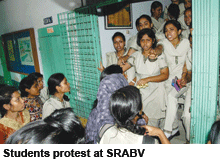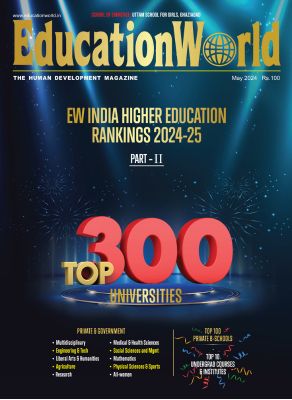Agitational including street politics popularised by Trinamool Congress Party leader and West Bengal chief minister Mamata Banerjee, who famously ended 34 years of uninterrupted rule in the state of the CPM (Communist Party of India-Marxist)-led Left Front government in the summer of 2011, seems to have struck a resonant chord within the state’s student communities. It is now haunting the Trinamool government which is being hoist on its own petard.
The pre-Christmas week witnessed a spate of protests and agitations in school campuses across Kolkata with teenage students demanding ‘grace marks’ in selection tests qualifying them to write board exams. All schools conduct internal selection tests before class X and class XII board examinations as permitted by rules of the West Bengal Board of Secondary Education (WBBSE). Inevitably some students fail these tests and are held back to write the boards the following year. And it’s an annual ritual for detained students and their parents to plead with the school principal for grace marks to qualify to write the board exams. However, organised protests by students insisting on clearance to write the boards is a new phenomenon. Academics in Kolkata have been taken aback by school students organising — in the manner of college students — to press for grace marks with little regard for school rules or the law.
 The protests started with the Santoshpur Rishi Aurobindo Balika Vidyapeeth in South Kolkata, spread to Jagatpur Rukmini Vidyamandir in Behala (South Kolkata), Annada Sundari Hindu Balika Vidyapith in Baguihati (North Kolkata), Kasturba Kanya Vidyapeeth in Sinthee (North Kolkata) and Rishi Aurobindo Vidyaniketan in Shyamnagar (North Kolkata). There were organised protests in these schools by flunked students demanding grace marks, with some agitators resorting to strong arm tactics.
The protests started with the Santoshpur Rishi Aurobindo Balika Vidyapeeth in South Kolkata, spread to Jagatpur Rukmini Vidyamandir in Behala (South Kolkata), Annada Sundari Hindu Balika Vidyapith in Baguihati (North Kolkata), Kasturba Kanya Vidyapeeth in Sinthee (North Kolkata) and Rishi Aurobindo Vidyaniketan in Shyamnagar (North Kolkata). There were organised protests in these schools by flunked students demanding grace marks, with some agitators resorting to strong arm tactics.
At the government aided Santoshpur Rishi Aurobindo Balika Vidyapeeth (SRABV, estb. 1950), trouble broke out on Monday, December 17 when 29 girl students who failed to clear the class XII selection test, staged a protest against the headmistress. The agitation was supported by “outsiders” including some guardians who besieged the headmistress’ room, demanding the students be declared passed. Although school officials promised to show the answer scripts of all failed students, the latter insisted that they be deemed passed. A gherao (siege) started around 3.30 pm and continued till 1.30 p.m, Tuesday.
Sreemati Ghosh, headmistress of the school, reported the protests, prompting WBSSE secretary Achintya Pal and his deputy Moloy Roy to visit the school on December 18. A meeting was held in the presence of the agitating students where Pal and Roy announced that they had detected gross anomalies in the tabulation sheets and demanded a retest for the failed students, though the West Bengal Council of Higher Secondary Act, 1975 makes it clear that WBSSE’s role is limited to conducting examinations and framing the syllabus.
Meanwhile with news of the ‘successful’ SRABV agitation spreading, similar demands cropped up in schools in Murshidabad and Burdwan districts. Under immense pressure, the principal of the Krishnadebpur Girls High School (Kalna) caved in to the demand of agitating class X students and parents and permitted 27 girls who had failed the prelims to write the WBBSE board exam. A school source informed media that the Trinamool Congress-controlled managing committee of the school had “mounted pressure on teachers to take a decision in favour of the failed students”.
“The protest was dominated by outsiders. It is unfortunate that students are being misled for petty political advantage,” said Sreemati Ghosh to your correspondent.
Academics in West Bengal which in the pre-Left Front era was in the vanguard of the nation’s education renaissance but is ranked near the bottom in NUEPA’s Educational Development Index (EDI), are becoming increasingly disillusioned with the “mob rule” of the Trinamool Congress. “The logical culmination of such anarchy is that soon students will demand abolition of exams or the right of mass copying. Moreover the teacher-student relationship will deteriorate and that will have an adverse effect on the learning process. To resolve the issue, the failed students should be counseled with proper evidence of their shortcomings. The intervention of external elements such as parents, council members and political outfits should be totally banned. The rule of law has to prevail within school premises as in society,” says Sudin Chatterjee, former president of the West Bengal Council of Higher Secondary Education.
Yes, but the example has to flow top down.
Baishali Mukherjee (Kolkata)




























